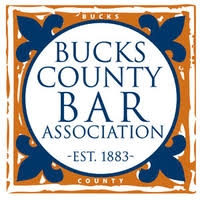Antheil Maslow & MacMinn, LLP is proud to sponsor National Alliance on Mental Illness (NAMI) Bucks County, PA's Stride for Mental Health Awareness walk. The walk is Saturday May 18th beginning at 1 pm at Warminster Community Park, 350 E. Bristol Road, Warminster. Funds raised support NAMI Bucks County's education and support program expansions throughout the area. NAMI Bucks County is dedicated to raising awareness and providing support and education to end the stigma that surrounds mental health issues, and promote recovery for individuals living with mental illness. For more information, to donate, sponsor and register, visit www.namibucksstride.org.
Antheil Maslow & MacMinn Co-founding Partner Susan Maslow received the Central Bucks Chamber of Commerce Business & Arts Award at the Chamber's 73rd Annual Celebration Luncheon on Friday, April 12th. This is the Chamber's 23rd Business and Arts Award, which is bestowed on a business person or organization that has extended itself in support of the arts in the community. Ms. Maslow is being recognized for her extraordinary commitment and creative dedication to the arts in Bucks County through her efforts on the many Bucks Fever Award premier events and other cultural Chamber endeavors.
Susan Maslow is an experienced general business and transactional attorney, with a long history of service on a variety of local nonprofit boards including Big Brothers Big Sisters Bucks County, Bucks County Women's Advocacy Coalition, and Pearl S. Buck International. She has been active on the Central Bucks Chamber of Commerce Board of Directors since 2008, and is the current Vice President of Cinema for the Bucks Fever Arts Program.
Recently, the Bucks County Bar Association (“BCBA”), an organization of attorneys dedicated to promoting and advancing the legal system and justice throughout Bucks County, conducted a plebiscite (peer evaluation) to evaluate ten attorneys who announced their candidacy for three vacancies on the Bucks County Court of Common Pleas, and the four current Judges of the Bucks County Court of Common Pleas who are running for retention.
Election day is Tuesday, May 21st. To assist in your decision making, here is a link to the plebiscite results.
A Post Divorce Checklist: Finish Things the Right Way and Sail Into the Future
Written by Mariam IbrahimThe divorce is final. No more deadlines to meet, papers to file or waiting time for all of it to be over. Now that the hard part is behind you, it is time for a fresh start. However, there might be a few things remaining for you to do before you can officially move on to the next chapter.
The following is a checklist of things that you might still need to do after your divorce is finalized:
- Review your divorce decree and create a list of things that you and your former spouse still need to satisfy. It could help if you create a calendar to visualize when certain things are due such as alimony/child support payments or when certain things are scheduled to terminate.
- Divide investment assets and retirement plans according to the terms of the divorce settlement agreement. Dividing a 401(k) or pension will require a Qualified Domestic Relations Order (QDRO). A QDRO is a court order telling the administrators of the retirement plan or the 401(k) how to divide the account. Most QDROs need to be drafted by an attorney or a CPA, signed by you and the former spouse, filed with the court and signed by a judge. If you are the recipient of a portion of your former spouse’s retirement account and you need the QDRO, it is imperative that you follow-up with your attorney to ensure the implementation of the QDRO is done in a timely fashion.
- Update all beneficiary designations with your workplace retirement plans, investment accounts, retirement accounts, trusts, annuities, life insurance, bank accounts, credit cards and any other place you might have listed your former spouse as a beneficiary.
- Obtain your own insurance coverage for your health, automobile, home and life insurance.
- Review your credit report to cancel any joint credit cards and close any joint accounts. Also, look through your credit report for any joint debts that you were not aware of.
- Update your estate planning documents including your will, any trusts, durable and health care power of attorneys. If you never had a will, this is a good time to consider making one.
- Change your emergency contacts with your workplace, doctors, health club, etc.
- If you changed your name back to your maiden name, you will need to notify different agencies. Most importantly, you will need to change your name on your social security card, passport and your driver’s license. You should also consider changing your name on your social media accounts.
- Consider changing your passwords to any emails or online accounts (i.e. Paypal, Facebook, etc.) that you might have shared the access information with your former spouse. Confirm that your spouse isn’t either a signer or authorized user on any of your online accounts.
- After the divorce, your financial circumstances have likely changed. You should consider developing, by yourself or with the help of a professional, a new financial plan for your new life.
Getting these things done might seem a burden now, after all you have been through, but it is necessary to avoid trouble later on. It is better that you go through this checklist and handle these issues as soon as your divorce is finalized to prevent possible future complications.
Once these things are done, you get to close that chapter and enjoy your new life with no worries about unhandled matters left over from the divorce.
Elizabeth J. Fineman, a Partner with the law firm of Antheil Maslow & MacMinn, LLP in Doylestown, Bucks County has been named co-editor-in-chief of the Pennsylvania Bar Association Pennsylvania Family Lawyer magazine. Ms. Fineman shares editor duties with Judy McIntire Springer of Astor Weiss Kaplan & Mandel, LLP in Philadelphia.
Fineman practices exclusively in family law and handles a variety of issues, including divorce, child support, alimony/spousal support, marital taxation, equitable distribution and child custody matters. She has handled many high-income support cases involving an intricate knowledge of both family law and complex financial issues.
Elaine Yandrisevits, an Associate in Antheil Maslow & MacMinn's Estates & Trusts practice group, will participate as faculty on April 23 & 24 at a National Business Institute continuing education program at the Sheraton University City Hotel in Philadelphia. The program will highlight information crucial to effective adminstration of an estate in Pennsylvania.
This two-day basic level seminar will provide attorneys, accountants, tax professionals Financial Planners, Trust Officers and Paralegals an overview of the latest court and tax rules and the most effective transfer tools to ensure each client's estate is laid to rest according to the decedent's wishes, with minimal tax burden. This comprehensive program will cover all the skills needed to administer estates that include trusts and/or business interests.
Course Content
-
Crucial notice and filing requirements when opening the estate
-
Forms and checklists that will help you in administration.
-
Understand how income and estate tax deductions interact and find the most advantageous way to structure the tax returns
-
Learn how to use disclaimers more effectively.
-
Clarify what must be done when the trust becomes irrevocable.
-
Practical legal ethics guide focused on trusts and estates practice.
-
Prevent mistakes in final petition and ensure each estate is closed quickly and without disputes.
To register, visit Estate Administration Boot Camp
From a Litigator's Desk: Dealing with Personal Guaranties in Business Control Disputes
Written by Thomas P. DonnellyOne of the trickiest issues we deal with in business control disputes relates to the impact and management of personal guaranties on the part of the individual shareholders/members. A personal guaranty can be an impediment to a transaction among the shareholders consolidating ownership, an impediment to the withdrawal of a shareholder/member, or even a trigger of default under the terms of financing agreements in place between a business and its bank. Managing the impact and expectations of business owners as to a personal guaranty should be considered in the early stages of any potential transaction.
In nearly every small business banking relationship, the bank requires personal guaranties on the part of business owners. Personal guaranties, often even the more overbearing “spousal” personal guaranties, are the norm. Of course, the purpose from the bank’s perspective is to increase the level of security against repayment. The individual terms of the personal guaranty are governed by the language of the agreements.
The net effect of a personal guaranty is to, in effect, pierce the corporate veil and render the guarantor liable for the debt to the bank (or other creditor party to the guaranty agreement). In this way, not only does the bank obtain another source from which it can recover, but also dramatically impacts its practical bargaining power. Often we see shareholder agreements including and incorporating indemnification provisions which reference those situations in which a shareholder/member has guarantied an obligation to a lender. The value of such indemnification provisions is suspect given that the bank is always going to look to the path of least resistance to recover the extent of its obligation. In a guaranty the company is the primary obligor to the creditor. It is the primary obligor’s default which leads to exposure under a personal guaranty. In that instance, the company is not likely in a position to indemnify as its assets are likely devoted to the repayment of the primary guarantied obligation.
The best and most frequent approach to a personal guaranty in a business control dispute is to secure the release of the guaranty by the bank or other creditor as part of the transaction. Certainly, if the debt is retired in a third party sale, accounts are closed and the issue is moot. Not necessarily so in an ownership consolidation transaction involving a transfer among existing owners or members, or where one or more shareholders/members leaves the business. In that case, the business may continue and banking relationships may remain unmodified. The bank is not required to release the guaranty. Even further, under certain circumstances and agreements, a transaction may constitute an event of default of the credit arrangement. Management of the personal guaranty becomes an important part of the deal.
It is obviously always better to secure a release of a guaranty contemporaneous with a transaction. If that course of action is unavailable, indemnity is the only other option. In such cases, indemnification should flow from both the company and individuals as, if the guaranty is ever an issue, it is likely the Company’s ability to pay in the first place, which gives rise to creditor’s pursuit of the guarantor.
Elaine Yandrisevits, an associate in Antheil Maslow & MacMinn’s Estates and Trusts practice group, will participate as faculty on March 28th at a Pennsylvania Bar Institute continuing education program in Philadelphia, with simulcast at various locations. This basic to intermediate level program will teach the essential procedures for closing an Pennsylvania estate including: the advantages and disadvantages of the methods used to close an estate, steps involved in a Formal Court Accounting and Audit, Family Settlement Agreements and Receipts and Releases. To register visit www.pbi.org/meetings
Course Content
Examine Each Step of a Formal Court Accounting and the Audit Process
- Learn the statutory requirements for filing an account
- Understand the nuances involved in providing proper notice to an accounting
- Know what forms to use and when
- Understand how to handle objections to the accounting and walk through the audit process
Family Settlement Agreements and Receipts and Releases
- Understand what elements are required in a family settlement agreement
- Avoid common mistakes when drafting a family settlement agreement
- Review sample agreements and discuss enforceable issues
THE SIDE GIG AND THE FLSA: THE SIXTH CIRCUIT KEEPS UP WITH MODERN ECONOMIC REALITIES
Written by Patricia CollinsA recent case from the United States Court of Appeals for the Sixth Circuit demonstrates the ongoing struggle to apply the Fair Labor Standards Act (“FLSA”) to the “side gigs” that have come to signify the modern employment market. In Acosta v. Off Duty Police Services, Inc., United States Court of Appeals for the Sixth Circuit, Nos. 17-5995/6071 (February 12, 2019), the Sixth Circuit held that security offers working for Off Duty Police Services (“ODPS”) as a side job were employees entitled to overtime pay under the FLSA.
ODPS workers were either sworn law enforcement officers who worked for law enforcement entities during the day, or unsworn workers with no background in law enforcement. All workers had the same duties, but sworn officers earned a higher hourly rate. Duties included “sitting in a car with the lights flashing or directing traffic around a construction zone.” They were free to accept or reject assignments, but would be punished by withholding future assignments if they did so. When they accepted an assignment, ODPS instructed the workers where to report, when to show up, and who to report to upon arrival. ODPS provided some equipment, but workers did have to use some of their own equipment. Workers followed customer instructions while on assignment, and only occasionally received supervision from ODPS. ODPS paid workers for their hours upon submission of an invoice. Workers did not have specialized skills, as sworn officers and unsworn workers had the same duties.
ODPS treated the workers as “independent contractors.” As the facts set forth in the Sixth Circuit opinion demonstrate, the factors relevant to determining whether a worker is an independent contractor or employee do not provide a clear answer. The United States District Court for the Western District of Kentucky broke the tie this way: the court held that “nonsworn workers” were employees, but that the sworn officers were independent contractors because they “were not economically dependent on ODPS and instead used ODPS to supplement their incomes.”
The Sixth Circuit disagreed, noting that the FLSA is a broadly remedial and humanitarian statute, designed to improve labor conditions. The Sixth Circuit applied the “economic reality” test to determine that the sworn offers were also employees and not independent contractors, and to uphold the finding that unsworn workers were employees. Specifically, the Court noted that the officers provided services that represented an integral part of the business, and that the work required no specialized skills, that the officers made only limited investment in equipment, and that the workers had little opportunity for profit or loss. The Court noted that the facts did not “break cleanly in favor of employee or independent contractor status” regarding the right to control the work for the sworn officers.
Navigating Noncompetes Part III: Employees, the Restricted Parties
Written by Patricia CollinsIn the last segment of this series, we focused on concerns for employers in drafting and enforcing restrictive covenants. The choices for employees are fewer, and none of them are good. Employees are generally asked to sign restrictive covenants at two points: either at the beginning of their career or upon a promotion or other significant improvement in employment status. Such agreements diminish employees’ choices should they want to move on from their current employment, whether or not the restrictions are actually enforceable.
Some employers require employees to sign a restrictive covenant at the outset of their employment. If the employee was recruited and has other employment choices, the employee has some bargaining power to reduce the duration or scope of the restrictions. But this is seldom the case, and the law recognizes that employees generally have limited (or no) bargaining power in these situations. The law disfavors restrictive covenants for precisely this reason: the agreement imposes a post-employment restriction that may hinder the employee’s ability to earn a living at a time when the employee has little or no bargaining power to negotiate the restriction.
This calculus changes a little when the employee is required to sign a restrictive covenant in conjunction with a promotion or other benefit, such as participation in a stock option or bonus program. Then the employee has to decide whether the value of the promotion or other benefit is enough to justify agreeing to the post-employment restriction. Where it is not, the employee can refuse to sign, forcing the employer to decide how valuable this employee is to the employer. However, the employee should factor into this decision that the employer is free to terminate the employee for refusing to sign. And, this might be a good thing, as the employee will be leaving the employer without a noncompete.
Frequently, employees breach the restriction without consulting an attorney first based on the widely held, mistaken, belief that courts do not enforce noncompetes. Let’s be clear: courts will enforce noncompetes where the law permits them to do so. More importantly, the old employer will sue the employee and the employee’s new employer for breach of the agreement. The new employer may terminate the new employment to avoid the costs of litigation. Litigation regarding these matters is expensive, time-consuming and stressful. Practically speaking, most employers will refuse to hire an employee with a restrictive covenant even if it is unenforceable for any number of technical reasons we have discussed in this series.
At the very least, employees should consult an attorney prior to signing, even if they have limited bargaining power, to understand the restrictions in place. We can help employees with that review, and we can help employees navigate the minefield of finding new employment when they have a noncompete in place.










